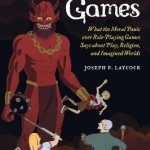Dangerous Games: What the Moral Panic Over Role-Playing Games Says About Play, Religion, and Imagined Worlds
BookThis item doesn’t have any media yet
2015 | Philosophy, Psychology & Social Sciences
The 1980s saw the peak of a moral panic over fantasy role-playing games such as Dungeons and Dragons. A coalition of moral entrepreneurs that included representatives from the Christian Right, the field of psychology, and law enforcement claimed that these games were not only psychologically dangerous but an occult religion masquerading as a game. Dangerous Games explores both the history and the sociological significance of this panic. Fantasy role-playing games do share several functions in common with religion. However, religion as a socially constructed world of shared meaning can also be compared to a fantasy role-playing game. In fact, the claims of the moral entrepreneurs, in which they presented themselves as heroes battling a dark conspiracy, often resembled the very games of imagination they condemned as evil. By attacking the imagination, they preserved the taken-for-granted status of their own socially constructed reality. Interpreted in this way, the panic over fantasy-role playing games yields new insights about how humans play and together construct and maintain meaningful worlds.
Laycock's clear and accessible writing ensures that Dangerous Games will be required reading for those with an interest in religion, popular culture, and social behavior, both in the classroom and beyond.
Related Items:
| Published by | University of California Press |
| Edition | Unknown |
| ISBN | 9780520284920 |
| Language | N/A |
Images And Data Courtesy Of: University of California Press.
This content (including text, images, videos and other media) is published and used in accordance
with Fair Use.
